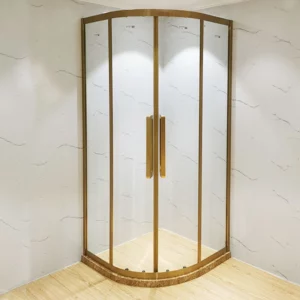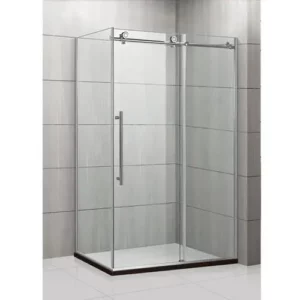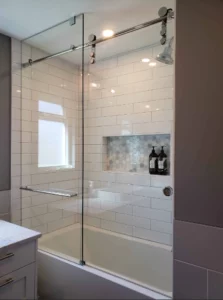What are the different types of shower enclosures?
There are several different types of shower enclosures available on the market, each with their own unique design and features. Some of the most common types include:
Frameless shower enclosures: These enclosures are made entirely of glass and are held in place with minimal hardware, giving them a sleek and modern look.
Semi-frameless shower enclosures: These enclosures have a minimal amount of framing around the edges of the glass, but are still mostly made of glass.
Framed shower enclosures: These enclosures have a full frame around the glass panels, providing extra support and stability.
Walk-in shower enclosures: These enclosures do not have any doors or barriers, making them easy to enter and exit.
Corner shower enclosures: These enclosures are designed to fit into the corner of a bathroom, making efficient use of space.
Neo-angle Shower Enclosures: These enclosures are similar to corner enclosures but have a unique shape, with one side longer than the other two.
Quadrant shower enclosures: These enclosures are curved, with one or two curved glass panels and a door that slides or swings open.
Choosing the right type of shower enclosure for your bathroom will depend on your personal preferences, the available space, and your budget. It is important to consider factors such as the size of the enclosure, the materials used, and any additional features such as shelves or towel bars when making your decision.
What factors affect the price of a shower enclosure?
Several factors can affect the price of a shower enclosure, including the materials used, the size and complexity of the enclosure, the level of customization, the brand, and the location where it is purchased. Enclosures made with high-quality materials, such as tempered glass or stainless steel, may be more expensive than those made with lower-quality materials. Larger and more complex enclosures, such as those with multiple panels or custom shapes, may also come at a higher cost. Additionally, enclosures from well-known brands or those sold in certain locations may be priced higher than those from lesser-known brands or locations. Finally, features such as special coatings or treatments, such as anti-fog or self-cleaning, may also add to the overall price.
How can I save money on a shower enclosure?
You can save money on a shower enclosure by following these tips:
Compare prices: Look at different stores and websites to compare prices and find the best deals.
Choose a simpler design: Shower enclosures with fewer features and simpler designs are often less expensive.
Look for sales: Keep an eye out for sales or discounts that can save you money.
Consider materials: Different materials have different costs. For example, a shower enclosure made of tempered glass will be more expensive than one made of acrylic or fiberglass.
DIY installation: Installing the shower enclosure yourself can save you money on installation costs.
Choose a standard size: Custom-sized shower enclosures are more expensive than standard-sized ones.
Opt for a basic finish: Premium finishes like brushed nickel or oil-rubbed bronze can add to the cost of the shower enclosure. Choose a basic finish to save money.
Buy a complete kit: Buying a complete shower kit with the base, walls, and door can be cheaper than buying each component separately.
By following these tips, you can save money on your shower enclosure without sacrificing quality or style.
Where can I find the best deals on shower enclosures?
There are several places where you can find the best deals on shower enclosures:
Online Retailers: Many online retailers offer competitive prices and deals on shower enclosures. You can browse through various options and compare prices before making a purchase.
Local Home Improvement Stores: Home improvement stores like Home Depot and Lowe’s often have sales and discounts on bathroom fixtures, including shower enclosures.
Manufacturer’s Website: Visiting the manufacturer’s website can give you an idea of the latest products and deals they have on shower enclosures. You can also sign up for their newsletter to receive exclusive offers and discounts.
Discount Retailers: Discount retailers like Walmart and Costco may also offer shower enclosures at lower prices.
Second-Hand Marketplaces: You can also find deals on shower enclosures on second-hand marketplaces like Craigslist, Facebook Marketplace, and eBay. However, make sure to inspect the product thoroughly before purchasing and check the seller’s reputation to avoid scams.
Overall, researching and comparing prices across multiple retailers can help you find the best deals on shower enclosures.
How much does a shower enclosure cost?
The cost of a shower enclosure can vary widely depending on a variety of factors, such as the size, materials used, style, and additional features. On average, a basic shower enclosure without installation can cost anywhere from $200 to $1000 or more. However, larger or more complex enclosures, such as walk-in showers or custom designs, can cost several thousand dollars. The price can also vary depending on where you purchase the enclosure, as some retailers may offer discounts or promotions. It’s important to consider your budget and needs when shopping for a shower enclosure and to get multiple quotes from different suppliers to compare prices.
What should I consider when choosing a shower enclosure for my budget?
When choosing a shower enclosure for your budget, there are several factors to consider:
Size: The size of the shower enclosure will affect the overall cost. A larger shower enclosure will cost more than a smaller one.
Material: Shower enclosures can be made from different materials such as glass, acrylic, or tile. Glass enclosures tend to be the most expensive, while acrylic and tile options are more budget-friendly.
Style: There are different styles of shower enclosures, including framed, frameless, and semi-framed. Frameless enclosures tend to be more expensive than framed ones.
Installation: The cost of installation can vary depending on the complexity of the project. If you have plumbing or electrical work that needs to be done, the cost can go up.
Brand: Some brands are known for their quality and durability, and they may come with a higher price tag. However, it’s important to do your research and make sure you’re getting good value for your money.
Accessories: Additional accessories such as showerheads, shelves, and towel bars can also affect the overall cost.
Consider these factors when choosing a shower enclosure for your budget to ensure you get the best value for your money.
1. What factors influence the cost of a shower enclosure?
Factors Determining Shower Enclosure Pricing
When you’re in the market for a new shower enclosure, the price can be influenced by several factors. Understanding these can help you make an informed decision when purchasing.
Materials Used: The kind of material used in a shower enclosure plays a significant role in its cost. Glass enclosures, for instance, can vary in price based on thickness and type of glass.
Size: Larger enclosures or custom sizes might be pricier. For instance, a 30 inch shower enclosure may differ in price from a 48×48 shower enclosure.
Brand: Some brands are known for their premium quality and can be more expensive.
Features: Enclosures with special features like frosted glass, patterns, or advanced door mechanisms can add to the cost.
Installation Costs: Some enclosures require professional installation which can add to the overall expense.
Design: Custom designs or unique shapes can also influence the price.
Type of Door: The choice between a sliding Shower Door or a hinged one can affect the cost.
Location: Prices may vary based on where you’re located and the availability of products.
Market Trends: Like all products, the demand and supply can influence prices. For example, shower walk in enclosures might be trending and hence be priced higher.
Warranty and Support: Enclosures that come with extended warranties or guarantees might be priced slightly higher.
2. Are there any affordable yet durable materials for shower enclosures?
When it comes to shower enclosures, there's often a balance between durability and affordability. Here are some materials that strike that balance:
Fiberglass: This is a common and cost-effective choice. It's lightweight and relatively durable, though not as long-lasting as some other materials.
Acrylic: Slightly more expensive than fiberglass but offers a shinier look and is resistant to scratching.
Tempered Glass: While glass enclosures are generally more expensive, tempered glass provides durability at a slightly higher price point.
Polystyrene: A type of plastic that’s cheaper but might not have the longevity of glass or acrylic.
PVC: Another affordable option, PVC shower enclosures are easy to install and maintain.
Tile: While the initial cost might be high, tile enclosures are durable and can last a long time with proper maintenance.
Composite Materials: These are made from a combination of materials, offering both durability and affordability.
Laminated Glass: This consists of two or more sheets of glass with an interlayer of material like PVB. It’s tougher than regular glass.
Vinyl: Lightweight and cost-effective, vinyl enclosures are easy to install but may not be as durable as other materials.
Aluminum Frames: Often used with glass enclosures, aluminum frames provide structural support and are both affordable and durable.
3. How does the size of the enclosure impact its price?
Size is a pivotal factor when determining the price of a shower enclosure. Here's a breakdown:
Standard Sizes: These are generally more affordable as they are mass-produced. For example, 30 inch shower stall kits might be available at a standard price in many stores.
Custom Sizes: Any deviations from standard measurements can increase costs due to customizations.
Larger Sizes: Bigger enclosures, such as the 48×48 shower enclosure, might cost more due to the increased material and labor required.
Complex Designs: Enclosures with more corners or curves, such as a 30 corner shower stall, might be more expensive due to the intricate design.
Height Adjustments: Taller enclosures might add to the overall cost because of the extra material needed.
Specialty Glass Sizes: If you're opting for a specific type of glass, its price can vary based on size.
Base or No Base: Prices can differ based on whether you're purchasing just the enclosure or the entire stall kit.
Space Considerations: The space you’re fitting the enclosure into can affect costs. Some spaces might need additional modifications which can impact the price.
Installation: Larger enclosures might need more hands on deck or specialized tools, adding to the installation costs.
Transportation: Larger enclosures or unique sizes might have higher shipping or delivery charges.
4. What are the benefits of investing in a high-quality shower enclosure?
When contemplating a purchase for your bathroom, quality should be a significant consideration. Here are some reasons why investing in a high-quality shower enclosure is worth it:
Durability: Premium materials, such as tempered or laminated glass, last longer and can withstand daily wear and tear.
Aesthetic Appeal: High-quality enclosures elevate the overall look of the bathroom, offering sleek designs and finishes.
Safety: Premium enclosures often come with safety features, like shatterproof glass or secure door mechanisms.
Low Maintenance: Quality enclosures tend to be easier to clean and maintain, ensuring they look new for a longer period.
Value for Money: While the initial investment might be higher, a quality shower enclosure often means fewer repairs and replacements in the long run, saving money over time.
Better Seals: High-quality enclosures typically come with better sealing mechanisms, ensuring that water doesn't leak out and damage the surrounding areas.
Customization: Premium brands often offer more options for customization in terms of size, design, and features, allowing you to get an enclosure that perfectly fits your needs.
Enhanced Experience: A top-tier shower enclosure can provide a more luxurious and comforting shower experience, adding to the overall quality of life.
Increased Home Value: A well-maintained bathroom with quality fittings can increase the resale value of your home.
Warranty & Support: Most high-quality shower enclosure brands offer extended warranties and better customer support, ensuring peace of mind for the buyer.
5. How do shower cubicles differ from regular shower enclosures?
Distinguishing between a shower cubicle and a regular shower enclosure can sometimes be challenging. Here's a breakdown of their key differences:
Definition: A shower cubicle is typically a self-contained unit, meaning it has its own tray and door, while a regular shower enclosure is often just the barrier separating the shower space from the rest of the bathroom.
Installation: Shower cubicles are usually easier and quicker to install as they come as pre-fabricated units. In contrast, shower enclosures may need more detailed installation.
Space: Shower cubicles are often more compact, making them ideal for smaller bathrooms or en-suites. Enclosures, on the other hand, can be customized to fit larger spaces.
Maintenance: Cubicles, being self-contained, usually have fewer issues with leaks or water escaping. Regular enclosures require proper sealing to prevent water spillage.
Cost: Shower cubicles, with their all-in-one design, can sometimes be more affordable than purchasing all parts of an enclosure separately.
Flexibility: Regular shower enclosures offer more flexibility in design and can be adjusted to fit a particular space or design aesthetic.
Materials: Both can be made of various materials, but cubicles often come in fiberglass or acrylic, while enclosures might offer more glass or tile options.
Appearance: Cubicles generally have a more uniform appearance, while enclosures can be mixed and matched with different tiles, doors, and hardware for a unique look.
Water Pressure: Some cubicles come with built-in shower systems, which might differ in water pressure and features than separate shower systems used with enclosures.
Customization: While some cubicles offer various features, regular shower enclosures generally provide more room for customization.
6. How do walk-in enclosures enhance the shower experience?
Shower walk-in enclosures are becoming increasingly popular, and here's why:
Ease of Access: With no door to open or close, walk-in enclosures are easier to enter and exit, especially for the elderly or those with mobility issues.
Spacious Feel: The open design of walk-in enclosures gives the bathroom a more spacious and airy feel.
Modern Aesthetic: Walk-in designs are sleek and contemporary, providing an updated look to any bathroom.
Less Maintenance: Without doors or tracks that can accumulate soap scum or mildew, walk-ins are often easier to clean.
Versatility: They can be tailored to fit any space, whether it's a tight corner or a large, luxurious bathroom.
Safety: The absence of doors reduces the chances of accidents like tripping or door-related injuries.
Customization: With various tiles, glass options, and hardware, you can design a walk-in enclosure to match your personal style.
Enhanced Showering Experience: The open design can make the act of showering feel more natural and liberating.
Increased Resale Value: Modern homebuyers often appreciate the aesthetics and functionality of walk-in enclosures.
Efficiency: Most walk-in designs incorporate effective drainage systems and splash guards, ensuring water stays within the shower area.
7. What are the main considerations when choosing a shower door for an enclosure?
Selecting the right Shower Door for your enclosure is vital not just for aesthetics but also for functionality. Here's a guide to help you make an informed choice:
Swing Direction: Decide if you want a left or right-hand door, a pivot door, or a sliding door. Your bathroom's layout will play a big part in this decision.
Space: Sliding or bi-fold doors are ideal for smaller bathrooms as they don't require extra space to open.
Style: The door's style should complement the overall design of your bathroom, be it modern, traditional, or transitional.
Glass Type: There are many types to choose from – clear, frosted, patterned, or tinted. Each offers different levels of privacy and style.
Frame vs. Frameless: Frameless doors give a clean, modern look, but framed doors can add color and contrast.
Material Durability: Ensure the door material, whether glass or acrylic, is durable and can withstand daily usage.
Maintenance: Some doors, especially those with fewer grooves and hardware, are easier to clean and maintain.
Safety: Tempered glass doors are safer as they're designed to shatter into small, harmless pieces if broken.
Installation: Some doors might require professional installation, which could affect the overall cost.
Budget: Shower doors vary in price based on design, material, and brand. It's essential to find a balance between cost and quality.
8. How can one maximize space with a 30-inch corner shower stall?
A 30-inch corner shower stall might seem compact, but with the right design choices, you can maximize its utility. Here are some tips:
Sliding Doors: These doors don't need space to swing open, making them perfect for smaller stalls.
Built-in Shelves: Use the vertical space by installing built-in shelves or niches to store your shower essentials.
Clear Glass: Using clear glass can make the enclosure feel more open and less cramped.
Light Colors: Lighter tiles or panels can make the space appear bigger and brighter.
Corner Seats: A small corner seat not only adds functionality but also utilizes the corner space effectively.
Effective Drainage: Ensure the stall has a good drainage system to avoid waterlogging in such a compact space.
Minimal Hardware: Opt for sleek and minimal hardware to reduce visual clutter.
High-Quality Materials: Using good quality materials ensures longevity, especially crucial for spaces that are frequently used.
Good Lighting: Ensure the stall is well-lit, which can make it feel more spacious and comfortable.
Opt for Rounded Corners: Rounded corners can make the space feel less restrictive and more fluid.
9. Why is it essential to consider the quality of a shower enclosure for larger sizes like 48×48?
Larger shower enclosures, such as the 48×48 shower enclosure, demand more attention to quality for various reasons:
Structural Integrity: Bigger enclosures require materials that can support their size without compromising stability.
Safety Concerns: Larger glass panels or doors have a greater risk of injury if they shatter. High-quality tempered glass reduces this risk.
Cost Efficiency: Investing in a good quality large enclosure can be cost-effective in the long run, as they might need fewer repairs or replacements.
Appearance: Larger enclosures are more prominent in a bathroom, so their design and finish can significantly impact the room's aesthetics.
Customization: High-quality enclosures often offer more customization options suitable for larger sizes.
Enhanced Experience: A larger shower space should provide a luxurious experience. Quality materials and design play a role in achieving this.
Maintenance: Quality materials are generally easier to clean and maintain, ensuring the enclosure looks new for a more extended period.
Water Sealing: Larger enclosures have more areas where leaks might occur. High-quality seals and materials ensure water stays inside.
Warranty & Support: Bigger, quality enclosures often come with extended warranties and better customer support.
Resale Value: A well-maintained bathroom with a quality large enclosure can enhance the resale value of a home.
10. What role do LSI keywords play in digital content related to shower enclosures?
LSI (Latent Semantic Indexing) keywords are crucial in the realm of digital content, especially when discussing specific topics like shower enclosures. Here's why:
Improved SEO: Using LSI keywords like "30 inch shower stall kits" or "shower walk-in enclosures" can improve a webpage's SEO, making it more discoverable on search engines.
Relevance: These keywords help search engines understand the context of your content, ensuring it's shown to users looking for related information.
Avoid Keyword Stuffing: LSI keywords allow for a natural inclusion of related terms without repeating the primary keyword excessively.
Better User Experience: Readers get more comprehensive information when various related terms are included in the content.
Staying Updated: Search engine algorithms are continually evolving. LSI keywords ensure your content stays relevant in these changing landscapes.
Competitive Edge: Using LSI keywords can give your content an edge over competitors who might not be optimizing their content as effectively.
Diverse Traffic: Including a range of related keywords can attract a broader audience looking for various related topics.
Higher Engagement: Content that resonates with a reader's query due to the inclusion of diverse, relevant keywords is likely to have higher engagement in terms of time spent on the page, shares, and comments.
Supports Long-Tail Keyword Strategy: LSI keywords often tend to be long-tail keywords, which can target specific user queries more effectively, leading to better conversion rates.
Content Authenticity and Depth: Using a variety of related terms showcases a depth of knowledge on the topic, making the content appear more authentic and well-researched to readers.
11. How do you ensure the longevity and durability of your shower enclosure?
Ensuring the longevity and durability of a shower enclosure is crucial, especially given the daily wear and tear these structures undergo. Here are some steps you can take:
Invest in Quality: As always, investing in a high-quality shower enclosure upfront can reduce the frequency of replacements and repairs in the future.
Regular Cleaning: Use appropriate cleaning agents to prevent the build-up of soap scum, limescale, and mildew. Always ensure you rinse thoroughly to avoid any residue.
Sealant Checks: Regularly check the sealants around the shower enclosure to ensure they're intact. Replace them if you notice any wear or damage.
Avoid Harsh Chemicals: When cleaning, avoid abrasive materials and harsh chemicals that can damage the glass or other materials in the enclosure.
Soft Water: If possible, use a water softener to reduce limescale buildup, which can occur quicker with hard water.
Handle with Care: While this might sound basic, ensuring that the shower doors or panels are not slammed or treated roughly can go a long way in ensuring their longevity.
Regular Inspections: Periodically check for any chips, cracks, or other damages. Early detection can prevent more significant issues in the future.
Proper Ventilation: Ensure your bathroom is well-ventilated. This can prevent the build-up of excess moisture, which can damage certain materials over time.
Follow Manufacturer Guidelines: Always adhere to the maintenance and care guidelines provided by the manufacturer. They are specifically designed to prolong the life of their product.
Professional Installation: Ensure that your shower enclosure is installed by professionals. Proper installation can prevent issues that arise from errors like misalignment or improper sealing.
In summary, shower enclosures are a significant investment in terms of both cost and bathroom aesthetics. By being informed about various aspects – from selection to maintenance – homeowners can ensure they get the best value and longevity out of their purchase.
Conclusion
By following these tips and tricks, you can save money on your shower enclosure without sacrificing quality or style. Remember to do your research and shop around to find the best prices and deals on the perfect shower enclosure for your bathroom.
More To Explore








